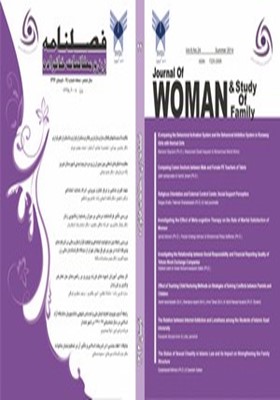بررسی تأثیر فراشناخت درمانی بر میزان رضایت زناشویی زنان
محورهای موضوعی : زن و خانواده
کلید واژه: زنان, رضایت زناشویی, فراشناخت درمانی,
چکیده مقاله :
این پژوهش با هدف بررسی تأثیر روش فراشناخت درمانی بر میزان رضایت زناشویی زنان انجام شد. جامعه آماری این پژوهش همه زنان دارای مشکل نارضایتی زناشویی مراجعه کننده به مرکز مشاوره احیای شهر مشهد بودند. از میان آنان 40 زن به روش هدفمند، انتخاب و به طور تصادفی در 2 گروه مساوی شامل گروه های آزمایش و کنترل جایگزین شدند. این مطالعه با استفاده از روش نیمه آزمایشی با طرح پیش آزمون و پس آزمون با گروه کنترل انجام شد. گروه آزمایش به مدت 8 جلسه 90 دقیقه ای در معرض درمان فراشناختی قرار گرفتند. در طول مدت مداخله گروه کنترل هیچ گونه درمانی دریافت نکرد. ابزار این پژوهش پرسش نامه رضایت زناشویی انریچ بود. داده ها با روش آمار توصیفی و تحلیل کوواریانس (آنکووا) تجزیه و تحلیل شدند. یافته ها نشان داد که فراشناخت درمانی بر میزان رضایت زناشویی زنان مؤثر بود. به عبارت دیگر فراشناخت درمانی به طور معناداری باعث افزایش رضایت زناشویی زنان شده است. نتایج حاکی از اهمیت توجه به مداخلات فراشناختی در افزایش رضایت زناشویی زنان بود.
This research aimed to investigate the effect of meta-cognitive therapy on the rate of women’s marital satisfaction. The statistical population included all the women with marital dissatisfaction problem who referred to Ehya Counseling Center of Mashhad City. From amony them‚ 40 women were selected with a targeted sampling method and randomly assigned to two equal groups including experimental and control. This study used quasi-experimental method by pre-test and post-test with the control group. The experimental group underwent ten sessions of 90-minute meta-cognitive therapy. The control group was left untreated. The instrument of this research was marital satisfaction questionnaire of evaluation and nurturing relationship issues communication and happiness (ENRICH). The data were analyzed by descriptive statistics and analysis of covariance (ANCOVA). The findings showed that meta-cognitive therapy has an effect on the rate of marital satisfaction of women. In other words, meta-cognitive therapy significantly led to an increase in marital satisfaction of women. The results demonstrated the importance of intervention by meta-cognitive therapy in increasing the women’s marital satisfaction.
- ازخوش، منوچهر؛ عسگری، علی (1386)، اندازه گیری باورهای غیرمنطقی در روابط زناشویی: استاندارد سازی پرسشنامه باورهای ارتباطی. فصلنامه روانشناسی تحولی: روانشناسان ایرانی، 4(14)، 153-137.
- سلیمانیان، علی اکبر (1373)، بررسی رابطه باورهای غیر منطقی با رضایتمندی زناشویی دانشجویان متاهل. پایان نامه کارشناسی ارشد روانشناسی، دانشگاه تربیت معلم.
- رزاقی، نرگس؛ نیکی جو، معصومه؛ موجمبازی، آدیس کراسکیان؛ ظهرابی مسیحی، آرینه (1390)، رابطه پنج عامل بزرگ شخصیت با رضایت زناشویی. فصلنامه روانشناسی تحولی: روانشناسان ایرانی، 7(27)، 177-269.
- موسوی، رقیه؛ فرزاد، ولی الله؛ نوابی نژاد، شکوه (1389)، تعیین اثر خانواده درمانی ساختاری در در مان اختلالات اضطرابی کودکان. مجله دانشور رفتار، سال 17، شماره 40، 10-1.
- یوسفی، ناصر؛ سهرابی، احمد (1390)، مقایسه اثربخشی رویکردهای خانواده درمانی مبتنی بر حضور ذهن و فراشناخت بر کیفیت روابط زناشویی در مراجعان در آستانه طلاق. مجله مشاوره و روان درمانی خانواده، 1(2)، 211-192.
- Cheah, C. H., & Park, S. Y. (2006), Sout Korean mother’s beliefs regarding aggression and social withdrawal in preschoolers. Early Childhood Research quarterly, 21, 61-75.
- Fisher, P. L., & Wells, A. (2008), Metacognitive therapy for obsessive–compulsive disorder: A case series. Journal of Behavior Therapy and Experimental Psychiatry, 39(2), 117-132.
- Goldenberg, I., & Goldenberg, H. (2004), Family Therapy (5th Ed.). Peacock Publishers.
- Greef, P. A. (2000), Characteristics of families that function well. Journal of family issues, 21(1), 274-289.
- Gwilliam, P., Wells, A., & Cartwright-Hatton, S. (2004), Does meta-cognition or responsibility predict obsessive compulsive symptoms: a test of the metacognitive model? Clinical Psychology and Psychotherapy, 11, 137-144.
- Morrison, A. P., & Wells, A. (2003), A comparison of metacognitions in patients with hallucinations, delusions, panic disorder, and non-patient controls. Behaviour Research and Therapy, 41, 251-256.
- Myers, S. G., & Wells, A. (2005), Obsessive–compulsive symptoms: The contribution of metacognitions and responsibility. Journal of Anxiety Disorders, 19(7), 806-817.
- Olson, D. H., & fowers, B. J. (1989), Predicting marital success with prepare: A predictive validity study. Journal of marital and family therapy, 12(2), 403- 413.
- Valizade, M., Hasanvandi, S., Mehrabizade Honarmand, M., & Afkar, A. (2013), Effectiveness of group metacognitive therapy for students metacognitive beliefs and anxiety. Social and Behavioral Sciences, 84, 1555-1558.
- Van der Heiden, C., Muris, P. T., & Van der Molen, H. (2012), Randomized controlled trial on the effectiveness of metacognitive therapy and intolerance-of uncertainty therapy for generalized anxiety disorder. Behavior Research & Therapy, 50(2), 100-119.
- Wells, A. (2000), Emotional disorders and metacognition: Innovative cognitive therapy. Chichester, UK: Wiley.
- Wells, A. (2009), Metacognitive therapy for anxiety and depression. New York: Guilford Press.
- Wells, A., Welford, M., King, P., Papageorgiou, C., Wisely, J., & Mendel, E. (2010), A pilot randomized trial of metacognitive therapy vs applied relaxation in the treatment of adults with generalized anxiety disorder. Journal of Behaviour Research and Therapy, 48, 429-434.

